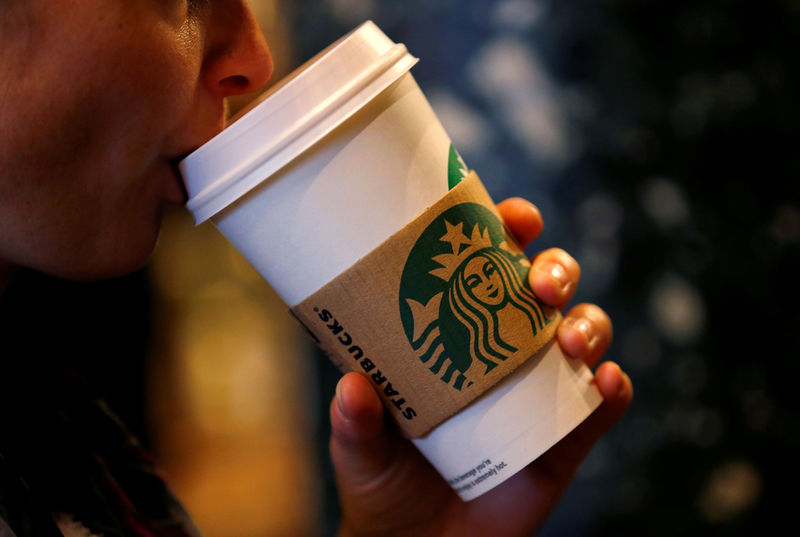By Andrew Chung and John Kruzel
WASHINGTON (Reuters) – U.S. Supreme Court justices on Tuesday expressed support for Starbucks (NASDAQ:) in the coffee chain’s challenge to a court order requiring the rehire of seven workers at a Memphis cafe who were fired for pursuing union membership.
The justices heard arguments in the Seattle-based company’s appeal against a lower court’s approval of a U.S. National Labor Relations Board (NLRB) order ordering the workers’ reinstatement. The case could make it more difficult to quickly halt labor practices deemed unfair under federal law while the NLRB resolves complaints.
The dispute centers on the legal standard that federal courts must use to issue a preliminary injunction requested by the NLRB under a federal law called the National Labor Relations Act. Such orders are intended as a temporary tool to stop unfair labor practices while a case is before the board.
Under section 10(j) of that Act, a court can make an order if it is deemed “just and appropriate”.
Starbucks has argued that the judge who issued the ban should have used a strict four-factor test to weigh the bid for an injunction, as courts typically do in non-labor disputes. This test involves an assessment of whether the party seeking relief would suffer irreparable harm and is likely to succeed on the merits of the case.
Some justices seemed to agree that courts, not the NLRB, should play the primary role in determining the likelihood of success in a case before issuing an injunction.
Remove ads
.
Conservative Justice Neil Gorsuch told Justice Department attorney Austin Raynor, who defended Starbucks’ order, that other federal agencies are subject to the stricter standard.
“In all types of alphabet soup agencies, we don’t do this,” Gorsuch said, using a term that describes agencies known by their initials. “District courts apply the ‘likelihood of success’ test as we normally understand it. Why, then, is this particular legal regime different from so many others?”
Liberal Justice Elena Kagan urged Raynor to explain “why courts should apply a lower standard.”
Raynor said the reason is “structural” because Congress intended the NLRB to be the primary arbiter in unfair labor disputes through the National Labor Relations Act, not the courts.
“But it also gave this power over injunctive relief to the court,” Kagan responded.
Starbucks argues that if the lower courts had applied stricter criteria, this case would have turned out differently.
About 400 Starbucks locations in the United States have unionized, involving more than 10,000 employees. Both parties have at times accused the other of illegal or inappropriate behavior.
Hundreds of complaints have been filed with the NLRB accusing Starbucks of unlawful labor practices, such as firing union supporters, spying on employees and closing stores during labor campaigns. Starbucks denies wrongdoing and says it respects employees’ right to choose whether to join a union.
In a break from acrimony, both sides agreed in February to create a “framework” to guide organizing and collective bargaining and potentially settle dozens of pending legal disputes.
Remove ads
.
‘BEST OF THE BEST’
Raynor told the justices that the NLRB seeks ten(j) injunctions in very few “the cream of the crop” cases; last year it only asked for seven, even though it receives 20,000 unfair labor charges annually.
“This is an expert body that has said, ‘We think these are the most forgiving,’” Raynor added.
But conservative Chief Justice John Roberts said, “I don’t know why the inference isn’t exactly the opposite.” Roberts said these may be the cases the board believes are “the most vulnerable.”
Conservative Judge Amy Coney Barrett emphasized to Raynor that federal courts serve as “an independent check” on the NLRB’s power.
“We recognize that this is not a rubber stamp,” Raynor responded.
Liberal Justice Ketanji Brown Jackson also pointed to the relatively small number of injunctions the NLRB seeks each year.
“This doesn’t sound like a big deal,” Jackson said.
“Whether it’s a huge problem or not, what petitioner (Starbucks) wants is simply a level playing field,” Blatt responded.
The case started in 2022, when workers at the Memphis Poplar Avenue store were among the first to unionize. They let a television news crew into the Starbucks cafe after hours to talk about the union campaign. Seven workers present that evening were fired, including some members of the union organizing committee.
Employees there ultimately voted to join the Workers United union.
The union has filed NLRB unfair labor charges over the firings and other disciplinary actions by managers. The agency sought an injunction, claiming that Starbucks unlawfully fired the employees because they supported unionization and sent a message to other employees.
Remove ads
.
U.S. District Judge Sheryl Lipman issued the order in 2022. The Cincinnati-based 6th US Circuit Court of Appeals upheld it in 2023.
The Supreme Court’s ruling is expected at the end of June.


